Are Blog Websites the New Classrooms of the Internet?
Home of the Blog now the Classroom Of The Internet

Introduction
The Web is changing the way we learn, and blog sites have become one of its most powerful teachers." What began as digital diaries have turned into classrooms — and they’re available to anyone with a smartphone or laptop. Whether you are learning to code, bake bread, invest in stocks or make sense of world politics, blogs frequently teach the lesson more quickly and more personally than traditional institutions.
Graduating From Lecture Halls to Blog Feeds
Learning used to require a body —a classroom with other bodies, a n instructor’s body, textbook bodies. Today, a blog post can explain the same concept to you in ten minutes with real-world examples, visuals, and links to resources.
Bloggers are the new educators. They distill complicated subjects, explain trends in everyday language, and add perspectives that come from working the front lines. While academic materials might take months or even years to be published, blogs are updated overnight in order to remain relevant.
Why Blogs Are So Effective for Sharing Information
Accessibility for All
Blogs are free and always open 24/7. No tuition fees. No enrollment deadlines. Expert knowledge is open to everyone and anyone, irrespective of background has equal access.
Personal Connection and Real-World Context
Bloggers write in relatable voices. They tabulate facts and set it in story, which lets readers get hold of ideas emotionally as well as intellectually. I do not need to be a cyber security text, or one on mental health survivor: meant to broaden my perspectives and interest while reaching out humanity by humaneness.
Bite-Sized Learning
Attention is short and blogs serve this demand. They chip away at complex ideas with bite-size paragraphs, lists and visuals. This is the micro-learning model that suits contemporary readers who like to have short takeaways versus long lectures.
Continuous Knowledge Updates
Unlike published textbooks, blogs become dynamic over time. A good blogger should be updating articles when new information comes in, so readers are brought along to the most current data and discoveries.
How is Digital Literacy Encouraged by Blog Websites.
Blogs impart not just information, but the art of discovery on the internet.
Readers exposed to blog reading are able not only get skillful at:
- Critical Thinking (Comparing Sources and Points of View)
- Digital navigation (linked materials, citations, multimedia)
- Self-study (they select the topics they are interested in pursuing)
In this light, bloggers don’t just disseminate information — they help equip individuals to think independently and critically about what they read, much as a good teacher does.
Examples of Blog-Based Learning
- Tech Blogs: Sites like TechCrunch and Smashing Magazine are educating millions of readers about coding, UX design, and AI.
- Health and Wellness Blogs: Nutritionists, psychologists and others offer up practical advice that’s as easy to digest as a lesson plan.
- Finance and Business Personal finance blogs like NerdWallet or The Financial Diet break down complicated economic terms to be digestible for the average reader.
All of these are like an open-access lecture —interactive, up-to-date and accessible.
The Salience of Blog Learning as a Collaborative Endeavor
One of the differences is interaction between a classroom and blogs. In comment sections, newsletters or forums, readers have the chance to engage with authors directly. This is a reciprocal deepening of passive reading into active conversation. It is in many ways like having office hours with the professor — only global, asynchronous and crowd-sourced.
Challenges and Responsibilities
Some blogs are not accurate or balanced. With no standard, misinformation proliferates freely. Readers have to become savvy about checking facts, confirming authorship and seeking trustworthy sources.
Meanwhile, bloggers still have an obligation to be ethical — using real information, updating old posts and revealing partners or sponsors.
The Future of Blogs as a Learning Playground
Given the rise of AI-powered tools, interactive content, and multimedia usage, blogs are shaping into more hybrid learning platforms. Video embeds, quizzes, infographics and podcasts turn a single post into a multisensory classroom.
The educational sector is starting to wrap its head around this concept–developing blog-style portals where students collaborate and learn via discussions and even story-telling rather than lectures.
Conclusion
Blog sites have become the lo-fi schoolrooms of the digital era. They democratize education, kindle wonder and connect experts to learners. Even if they never fully replace traditional schools, they’re accomplishing what Burbules suggests — and teaching us that learning no longer has to happen within walls or schedules or degree programs.
In a connected world as of today, every good blog post can be used to educate and everyone reading it has the chance to learn.

